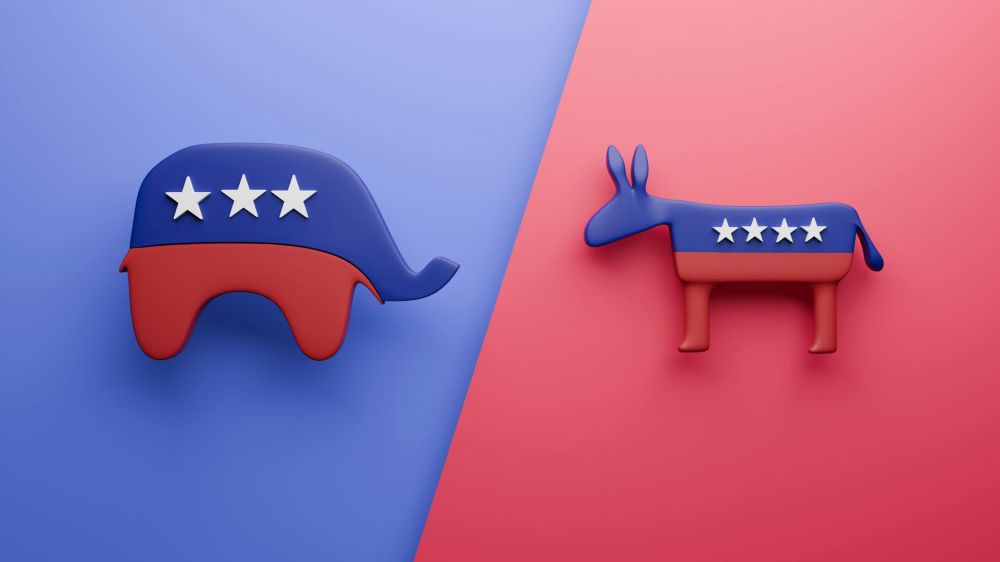 Getty Images
Getty Images
After 2024 election, Democrats call for change, Republicans favor status quo
By Diane Duenez (Producer)
- A recent Gallup poll shows nearly half of Democrats want to see their party become more moderate. Republicans want their party to stay the same.
- The poll shows partisans have grown more ideologically polarized.
- Americans’ identification with liberal or conservative reaches record highs.
Full Story
Nearly half of Democrats say they want their party to become more moderate after losing the White House and both houses of Congress in the 2024 election. Nearly the same amount of Republicans think their party should stay the same, according to a recent Gallup poll.
Media Landscape
See how news outlets across the political spectrum are covering this story. Learn moreBias Summary
- After losing the 2024 presidential election to Donald Trump, more Democratic voters want the party to shift to a more moderate stance, according to a new Gallup poll.
- The desire for moderation among Democrats has increased by 11 percentage points since 2021, reflecting a broader shift in U.S. voting attitudes.
- Gallup found that 45% of Democrat and Democrat-leaning voters believe the party should become more moderate, while only 30% of liberal Democrats agree.
- In contrast, only 27% of Republicans want their party to become more moderate, though this is a slight increase from 2021.
- No summary available because of a lack of coverage.
- Approximately 45% of Democrats and Democratic-leaning independents now prefer a more moderate party stance, indicating a significant shift in voter sentiment, as revealed by a recent Gallup poll.
- Support for a moderate stance has increased by 11 percentage points since early 2021, while support for a liberal agenda has decreased by 5 points to 29%.
- Critics contend that the party's progressive policies are disconnected from voter concerns, impacting recent election outcomes.
- Democratic voters' preferences have shifted since former President Joe Biden took office, with growing pressure on party leadership to adopt a more moderate position.
Bias Comparison
Bias Distribution
Left
Right
Untracked Bias
The results, released on Feb. 13, show a significant shift from the last time Gallup asked these questions in 2021, following the 2020 presidential election. In 2021, Democrats were pretty evenly split on whether they wanted the party to become more liberal, stay the same or move in a moderate direction.

Download the SAN app today to stay up-to-date with Unbiased. Straight Facts™.
Point phone camera here
Now, 45% of self-identifying Democrats report wanting the party to be more moderate, up 11 percentage points from 2021.
As for Republicans, the largest share in 2021 wanted the party to be more conservative. In 2025, 43% say the party should stay the same. The rest were evenly split on whether it should move in a moderate or conservative direction.
The post-election reckoning
Gallup’s findings confirm that Democratic voters are more dissatisfied with the party’s direction following the 2024 election results than in 2020. The Polarization Research Lab found similar results in December.
While the election did not change how Republicans and Democrats felt about voters from the opposing political party, it did change how voters felt about their party. Following November’s election, Democrats viewed their party 5% more negatively, while Republicans viewed their party 5% more positively.
“Losing an election didn’t change how partisans saw the other side, but it did change how partisans saw their own party,” said Sean Westwood, director of the Polarization Research Lab. “I think what’s really important is that we find that Americans evaluate democracy less on objective criteria and more based on how well their party did.”
How do voters feel about the president?
A separate Gallup poll shows an astounding gap between what Republicans and Democrats think about President Donald Trump. In his second term, Trump continues to be the only president with an incoming approval rating of less than 50%, according to data dating back to 1953. That said, his approval rating amongst Republicans is higher than any other president’s in recent history.
Get up to speed on the stories leading the day every weekday morning. Sign up for the newsletter today!
Learn more about our emails. Unsubscribe anytime.
By entering your email, you agree to the Terms & Conditions and acknowledge the Privacy Policy.
Ninety-one percent of Republicans said they approve of Trump at the start of his second term, similar to his 90% approval rating in 2017. Only 6% of Democrats approve of Trump going into his second term, a gap spanning 85 points. Former President Joe Biden holds the largest gap in political party approval ratings, spanning 87 points.
Media Landscape
See how news outlets across the political spectrum are covering this story. Learn moreBias Summary
- After losing the 2024 presidential election to Donald Trump, more Democratic voters want the party to shift to a more moderate stance, according to a new Gallup poll.
- The desire for moderation among Democrats has increased by 11 percentage points since 2021, reflecting a broader shift in U.S. voting attitudes.
- Gallup found that 45% of Democrat and Democrat-leaning voters believe the party should become more moderate, while only 30% of liberal Democrats agree.
- In contrast, only 27% of Republicans want their party to become more moderate, though this is a slight increase from 2021.
- No summary available because of a lack of coverage.
- Approximately 45% of Democrats and Democratic-leaning independents now prefer a more moderate party stance, indicating a significant shift in voter sentiment, as revealed by a recent Gallup poll.
- Support for a moderate stance has increased by 11 percentage points since early 2021, while support for a liberal agenda has decreased by 5 points to 29%.
- Critics contend that the party's progressive policies are disconnected from voter concerns, impacting recent election outcomes.
- Democratic voters' preferences have shifted since former President Joe Biden took office, with growing pressure on party leadership to adopt a more moderate position.
Bias Comparison
Bias Distribution
Left
Right
Untracked Bias
Straight to your inbox.
By entering your email, you agree to the Terms & Conditions and acknowledge the Privacy Policy.
MOST POPULAR
-
 AP Images
AP Images
Appeals court won’t reinstate Trump’s birthright citizenship order
Watch 0:396 hrs ago -
 Getty Images
Getty Images
Veteran federal prosecutor resigns amid pressure to investigate Biden agency
Watch 1:5212 hrs ago -
 Getty Images
Getty Images
Trump order stops taxpayer-funded benefits for immigrants in country illegally
Read13 hrs ago -
 Department of Defense
Department of Defense
Department of Defense and NASA face major cuts amid DOGE inquiries
Watch 3:2616 hrs ago




